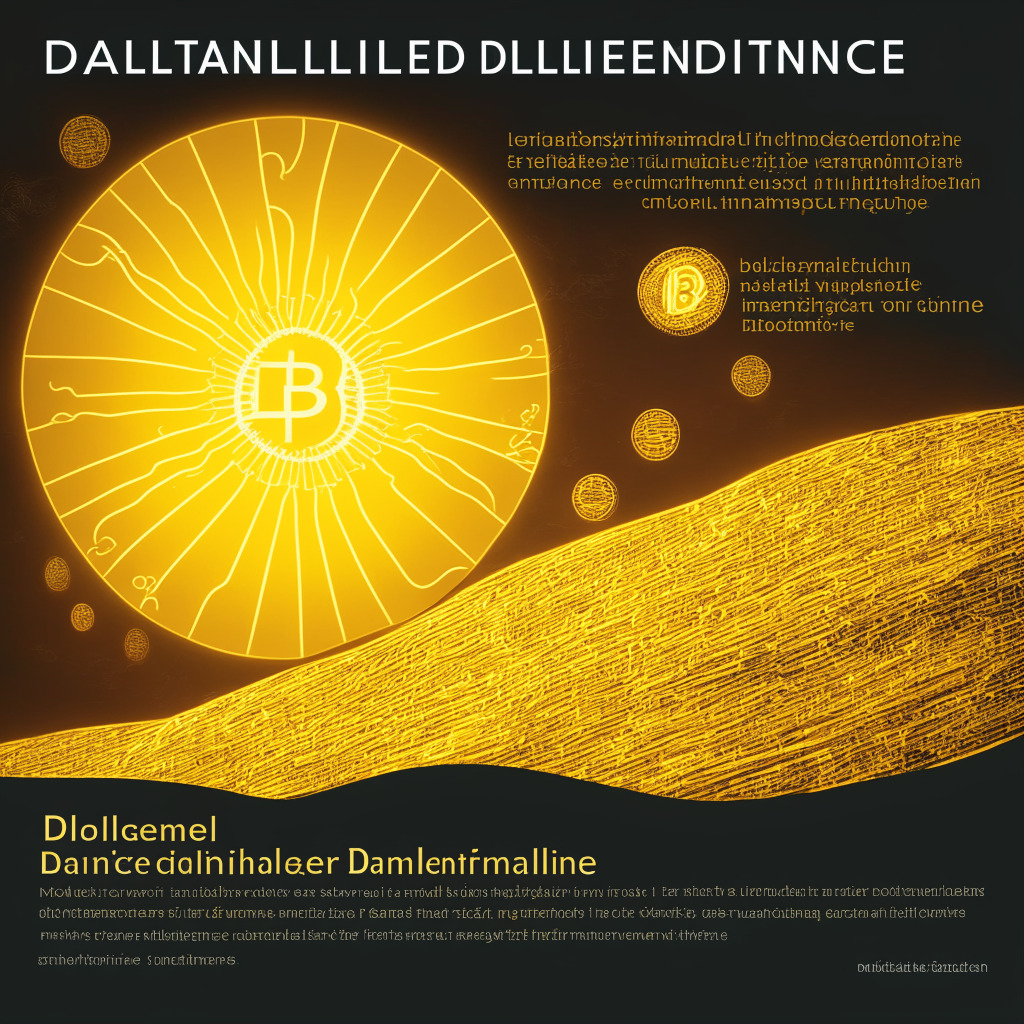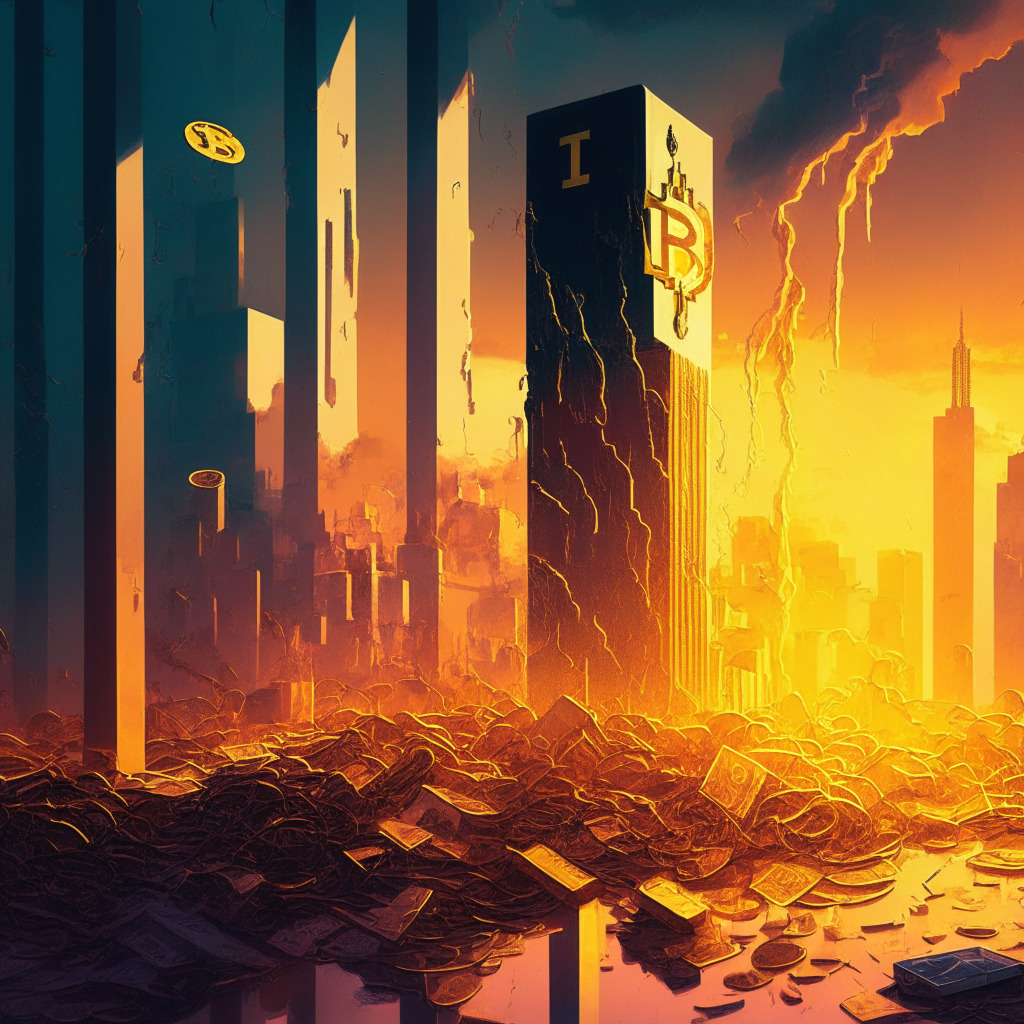Circle and Sequoia Capital were among top depositors in collapsed Silicon Valley Bank (SVB), raising concerns about depositor fund security and current regulations in the crypto space. The situation highlights the potential need for increased deposit insurance limits as more financial institutions embrace cryptocurrencies and blockchain technology.
Search Results for: Federal Deposit Insurance Corporation
FDIC Criticizes OKCoin: The Importance of Transparency in Crypto Insurance Claims
The FDIC accuses crypto exchange OKCoin of making misleading statements about FDIC insurance coverage on their platform. The regulator demands removal of fraudulent claims, stressing the importance of transparency and regulatory cooperation in the growing crypto industry.
FDIC Highlights Crypto Risk: The Crossroads of Innovation and Vulnerability
“In an act of unprecedented vigilance, the United States banking system has been alerted to the ‘novel and complex’ risks presented by cryptocurrencies, highlighted in a recent report by the Federal Deposit Insurance Corporation (FDIC). The FDIC has demarcated a critical area regarding digital assets risk in its annual risk review, focusing on the burgeoning and volatile crypto market.”
Exploring Venmo’s Expansion to Crypto Services: Boon or Bane?
Venmo, a comprehensive financial service, is allowing users to navigate the complexities of cryptocurrencies, even including assets like Bitcoin to its money transfer system. However, while users can purchase Bitcoin through various funding options, potential pitfalls such as scams, irreversible transactions, and the lack of protection from FDIC raise a need for careful consideration before diving into cryptocurrency purchasing.
Banking Crisis Ripple: Heartland Tri-State Bank’s Collapse & Its Implications on Industry Safety
“The disruption in the U.S. banking sector, illustrated by the recent collapse of Heartland Tri-State Bank, is attributed to rising U.S. interest rates and inadequate risk management. This crisis highlights a need for improved banking system safety measures and increased bank executive accountability.”
The Inevitable Clash: Central Bank Digital Currencies Versus Private Banks
“Central bank digital currencies (CBDCs) aim to regain monetary control by utilizing the blockchain, posing a threat to private financial institutions. Amid this, 93% of central banks are conducting CBDC research, predicting 24 CBDCs in circulation by 2030.”
Wyoming Judge Denies Fed Dismissal in Custodia Bank Case: Implications for Blockchain Banks
A Wyoming federal judge denied dismissal motions in Custodia Bank’s legal battle with the Fed, raising questions about the Fed’s role in overseeing digital asset banks. The outcome could impact future adoption and growth of blockchain banks and the Federal Reserve’s vetting role regarding these institutions.
Coinbase Stock Plunge Amid SEC Lawsuit: Balancing Innovation and Regulation in Crypto
The SEC filed a lawsuit against Coinbase, alleging unregistered operations and staking program, leading to a 20% stock plunge. This highlights the ongoing conversation about balancing innovation and regulation in the cryptocurrency industry as authorities take a more assertive stance.
Risky Payment Apps vs Secure Bitcoin: Navigating FDIC Protection & Financial Security
The Consumer Financial Protection Bureau (CFPB) warns that funds stored in popular payment apps may not be insured, highlighting possible financial uncertainties. Bitcoin, with its decentralized nature and self-sovereignty, gains attention as a secure alternative providing users sole ownership and control over their funds, unlike payment apps.
Uninsured Dangers: Digital Payment Apps, Crypto Exchanges, and the FDIC’s Role in Protecting Funds
The Consumer Financial Protection Bureau (CFPB) recently warned that digital payment apps like PayPal and Venmo, as well as crypto exchanges, lack FDIC insurance, posing risks to users’ funds. The FDIC has been targeting crypto companies making misleading claims about their insured status, emphasizing that no crypto exchanges are insured by the FDIC. Users must be cautious of potential risks associated with these platforms.
P2P Payment Apps: Uncovering Hidden Risks and the Importance of FDIC Coverage
The US Consumer Financial Protection Bureau warns that funds stored in nonbank payment platforms, including those offering crypto services, may not be protected by federal deposit insurance coverage. With recent collapses involving major banks, consumers must exercise caution and understand potential risks when managing assets through online payment services.
Collapse of Signature Bank: Crypto Exposure, Regulation, and Lessons for the Future
The collapse of Signature Bank highlights the potential systemic risks posed by crypto-linked banking activities and the importance of stringent regulatory oversight. It serves as a cautionary tale about unchecked growth, inadequate risk management, and the need for proper risk management practices in the volatile and rapidly evolving crypto industry.
FDIC Blames Crypto for Bank Collapses: Analyzing Risk Factors and Future Implications
The FDIC chair, Martin Gruenberg, attributes non-compliance with risk controls, poor governance, and dependence on uninsured crypto deposits to the collapse of crypto-friendly banks like Signature Bank and Silicon Valley Bank. While cryptocurrencies played a part, sound governance and responsible investments are essential for financial stability.
Signature Bank Collapse: Crypto Exposure’s Role and Lessons for Future Regulations
FDIC Chairman Martin J. Gruenberg suggests that the failure of Signature Bank may be partly due to its inability to comprehend risks tied to cryptocurrencies and inadequate management. While the direct impact of crypto exposure on the bank’s collapse remains unclear, it highlights the need for closer scrutiny on crypto market regulations.
Argentina’s Economic Crisis: Impact on Crypto, Traditional Assets, and Safe Havens
Argentina’s economic crisis, involving hyperinflation and peso devaluation, has led to discussions on the role of gold and cryptocurrencies like Bitcoin. Limited by costs and government control, fintechs in the country turn to stablecoins for remittances, while the financial turmoil may benefit risk-on assets such as Bitcoin.
Central Banks’ Veto Powers and Stablecoin Risks: Safeguarding Financial Stability in a MiCA Future
European Banking Authority Chair José Manuel Campa calls for central bank veto powers over large stablecoins, citing concerns for financial stability and public policy. The upcoming Markets in Crypto Assets (MiCA) regulation sets guidelines and requirements for stablecoin issuers, including stringent authorization and supervision processes.
Declining Trust in Banks: Will Crypto Emerge as Safer Alternative Amid Financial Turmoil?
A recent Gallup poll reveals that 48% of respondents in the US are concerned about their money in banks, with 20% being “very concerned.” In the context of the US banking system’s challenges, it remains to be seen if cryptocurrencies can emerge as a more stable and secure alternative for consumer finances.
Banking Crisis Impact on Bitcoin: Analyzing PacWest Bancorp’s Decline and Oil Prices
In the recent episode of Macro Markets, crypto analyst Marcel Pechman discussed the ongoing banking crisis and its potential impact on the cryptocurrency market, highlighting PacWest Bancorp’s 50% price decline as a primary concern. The rising interest rates might negatively affect Bitcoin, but eventually leading to positive outcomes for it.
Bank Collapses Fuel Crypto Adoption: Risks and Rewards in a Turbulent Financial Landscape
The recent collapse of major banks has raised concerns about financial infrastructure stability, leading to increased skepticism about centralized banking policies. This may result in a significant rise in cryptocurrency and NFT prices, with more people turning to Web3 alternatives for improved flexibility, efficiency, and decentralized finance solutions across multiple industries.
2023 Bank Collapses: Great Consolidation or Sign of Systemic Issues?
The U.S. banking industry faces turmoil with the collapse of three major banks, ongoing consolidation, and decreasing profitability. Amidst growing challenges, uncertainties, and financial losses, stakeholders must understand various factors at play, including central bank decisions and market dynamics, to navigate this uncertain future.
Democratic Candidate Links Anti-Crypto Sentiment to Bank Failures, Sparks Debate
Presidential candidate Robert Kennedy challenges anti-crypto sentiment within the Democratic party, attributing regulatory agencies’ “war on crypto” to several bank failures in March. He criticizes the FDIC and SEC for targeting crypto and leaving banks as collateral damage while expressing concerns about the suspected “Operation Chokepoint 2.0” government conspiracy.
Banking Crisis Impact on Bitcoin and the Future of Decentralized Finance
As the banking crisis continues, Bitcoin’s value surges amid financial turmoil, with investors potentially seeking alternatives in decentralized digital assets. Market participants should stay informed of developments and risks in both traditional banking and the evolving digital asset world to maintain financial stability.
Stability of Bitcoin Amid Fed’s Rate Hikes: Analyzing the Conflict in Monetary Policies
The Federal Open Market Committee raised the fed funds rate by 25 basis points, moving Bitcoin’s price remained stable at around $28,600. Observers eagerly awaited indications of a pause in historic rate hikes, but recent policy statements point to potential future economic impact from tighter credit conditions, requiring further monetary policy tightening. Bitcoin continues to serve as a potential hedge against traditional market fluctuations.
Bitcoin’s Battle at $28,000: Can BTC Hold On Amid Banking Crisis and Weakening USD?
Marcel Pechman explores Bitcoin’s $28,000 support amid its recent failure to break $30,000 resistance, leveraging impact on price, and U.S. banking issues affecting the digital asset. Various indicators suggest opportunities for both bulls and bears, as well as potential long-term benefits for Bitcoin in light of a weakened U.S. dollar.
Bank Stocks Plummet Amid Fears: Will Crypto Benefit from Traditional Banking Chaos?
The financial markets faced turmoil as stocks for major banks, including PacWest and Western Alliance, dropped over 20%. Regulators seized control of First Republic Bank, causing uncertainty for smaller banks and potential impact on the cryptocurrency sphere.
Biden’s Confidence in Banking Amid Defaults: Fact or Fiction? Pros, Cons, and Conflicts
Amid the recent collapse of the second, third, and fourth largest banks in American history, […]
JPMorgan Swallows First Republic Bank: A Banking Behemoth’s Feast or an Unexpected Lifeline?
JPMorgan Chase, the American banking colossus, has recently acquired all the assets of First Republic […]
Cross River Bank’s Regulatory Tug-of-War: Facing FDIC Scrutiny While Serving the Crypto World
On one hand, Cross River Bank has earned its reputation as a major player in […]
Banking on the Brink: A Domino Collapse Looming as First Republic Bank Stumbles and the Role of Crypto
The future of regional banks in the United States hangs in the balance as the […]
Banking on the Edge: How Crypto-Friendly Policies and Regulatory Easing Led to a Series of High-Profile Bank Failures
The recent series of high-profile bank failures in the United States has sparked intense debate […]
Navigating the Treacherous Terrain: Crypto-Assets and their Impact on the Banking Sector
“Crypto assets pose significant, complex challenges to the banking sector, as shown in FDIC 2023 Risk Review. Key issues include fast-paced innovation, legal ambiguity, immature risk management, ‘contagion risk’, and ‘stablecoin run’ risks. However, carefully negotiating these challenges could harness innovative benefits.”






























